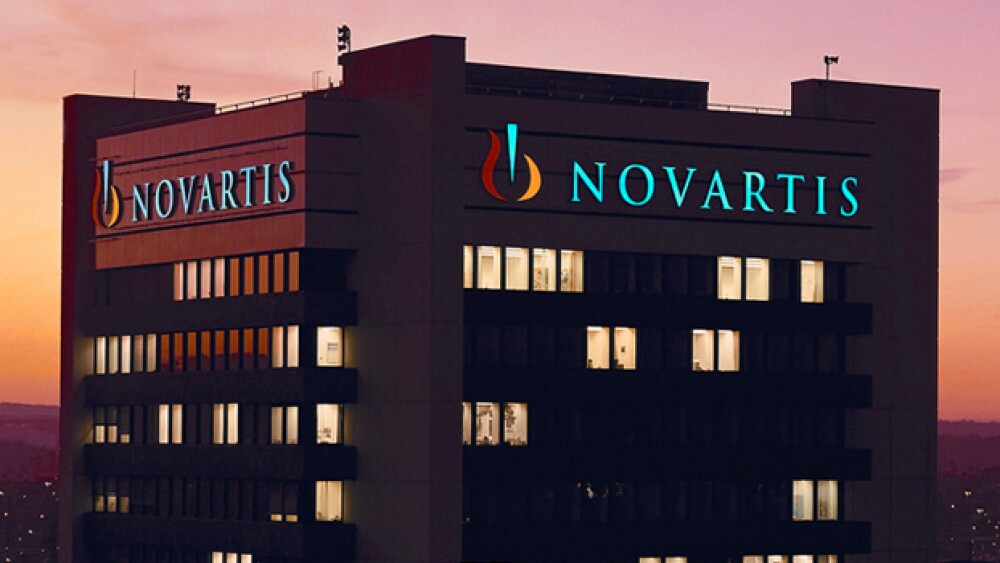If approved, this would be the second indication for Kymriah.
-Submission based on updated analyses from global, multi-center Phase II JULIET study, which met primary endpoint, including 6-month data to be presented at ASH 2017
- Kymriah has demonstrated durable response rates in r/r DLBCL, a highly aggressive and difficult-to-treat non-Hodgkin lymphoma that is fatal in nearly 40% of patients due to relapsed or refractory disease
- Novartis plans to submit an application for marketing authorization with the European Medicines Agency (EMA) in both DLBCL and pediatric ALL later this year
| [31-October-2017] |
| EAST HANOVER, N.J., Oct. 31, 2017 /PRNewswire/ -- Novartis today announced that the company has submitted a supplemental Biologics License Application (sBLA) to the US Food and Drug Administration (FDA) for Kymriah™ (tisagenlecleucel) suspension for intravenous infusion, formerly CTL019, for the treatment of adult patients with relapsed or refractory (r/r) diffuse large B-cell lymphoma (DLBCL) who are ineligible for autologous stem cell transplant (ASCT). In April 2017, Novartis received Breakthrough Therapy designation for r/r DLBCL which, if approved, would be the second indication for Kymriah. In August 2017, Kymriah became the first available chimeric antigen receptor T cell (CAR-T) therapy when it received FDA approval five weeks prior to its PDUFA date and was launched for patients up to 25 years of age with B-cell precursor acute lymphoblastic leukemia (ALL) that is refractory or has relapsed at least twice. Kymriah is a novel immunocellular therapy and a one-time treatment that uses a patient’s own T cells to fight cancer. “Kymriah represents a historic breakthrough in the evolution of individualized immunotherapy and we are committed to bringing this innovation to as many patients who may benefit as possible,” said Vas Narasimhan, Global Head of Drug Development and Chief Medical Officer, Novartis. “The response rates we’ve seen in the JULIET trial show that Kymriah has the potential to transform treatment for these patients and we look forward to collaborating with the FDA to make it available to patients for this second indication.” DLBCL is the most common form of non-Hodgkin lymphoma (NHL), a cancer of the lymphatic system, accounting for up to 40% of all NHL cases globally1. Roughly 50-60% of patients with DLBCL achieve and maintain complete remission after first-line therapy; however, roughly one-third of patients relapse after receiving first-line treatment2,3. Only about 25% of patients with r/r DLBCL are eligible for ASCT, the mainstay of secondary treatment. If left untreated, r/r DLBCL has a life expectancy of three to four months3. “The approval of tisagenlecleucel in the treatment of children and young adults with second relapse or refractory B-cell ALL was a watershed moment in the journey for researchers to develop immunocellular therapies,” said Stephen Schuster, MD, director of the Lymphoma Program and Lymphoma Translational Research, University of Pennsylvania Perelman School of Medicine. “The data show this therapy could change the treatment paradigm for patients with r/r DLBCL as we’ve seen durable complete responses in patients who previously relapsed or were refractory to prior therapies, and this second filing is a significant step toward realizing its potential for even more patients who are currently battling fatal blood cancers.” Kymriah is an innovative immunocellular therapy that is a one-time treatment. Kymriah uses the 4-1BB costimulatory domain in its chimeric antigen receptor to enhance cellular expansion and persistence. In 2012, Novartis and the University of Pennsylvania (Penn) entered into a global collaboration to further research, develop and commercialize CAR-T cell therapies, including Kymriah, for the investigational treatment of cancers. The submission is based on results from the Novartis-sponsored, global, multi-center Phase II JULIET study (NCT02445248), the first global, multi-center registration study for Kymriah in adult patients with r/r DLBCL. JULIET was conducted in collaboration with Penn and is the largest study examining a CAR-T therapy exclusively in DLBCL, enrolling patients from 27 sites in 10 countries across the US, Canada, Europe, Australia and Japan. Data from the six-month primary analysis of JULIET will be presented at the annual meeting of the American Society of Hematology (ASH) in December 2017. Novartis plans to submit an additional application for marketing authorization for Kymriah with the European Medicines Agency (EMA) in both DLBCL and pediatric ALL later this year. Novartis plans additional regulatory filings for Kymriah outside the US and EU in 2018. About CAR-T About Kymriah Manufacturing Building on the company’s experience, having manufactured CAR-T cells for over 250 patients from 11 countries across various indications in clinical trials, it has demonstrated a high-quality and reproducible product. Novartis continues to advance its CAR-T manufacturing expertise and make investments to support the anticipated demand to meet the needs of patients. Novartis Leadership in Immuno-Oncology Kymriah™ (tisagenlecleucel) Important Safety information (for pediatric and young adult patients with B-cell precursor acute lymphoblastic leukemia) Kymriah may cause side effects that are severe or life-threatening, such as Cytokine Release Syndrome (CRS) or Neurological Toxicities. Patients with CRS may experience symptoms including high fever, difficulty breathing, chills/shaking chills, severe nausea, vomiting and diarrhea, severe muscle or joint pain, very low blood pressure, or dizziness/lightheadedness. Patients may be admitted to the hospital for CRS and treated with other medications. Patients with neurological toxicities may experience symptoms such as altered or decreased consciousness, headaches, delirium, confusion, agitation, anxiety, seizures, difficulty speaking and understanding, or loss of balance. Patients should be advised to call their health care provider or get emergency help right away if they experience any of these signs and symptoms of CRS or neurological toxicities. Because of the risk of CRS and neurological toxicities, Kymriah is only available through a restricted program under a Risk Evaluation and Mitigation Strategy (REMS) in the US called Kymriah REMS. Serious allergic reactions, including anaphylaxis, may occur after Kymriah infusion. Patients may experience prolonged low blood cell counts (cytopenia), where one or more types of blood cells (red blood cells, white blood cells, or platelets) are decreased. The patient’s health care provider will do blood tests to check all of their blood cell counts after treatment with Kymriah. Patients should be advised to tell their health care provider right away if they get a fever, are feeling tired, or have bruising or bleeding. Patients may experience hypogammaglobulinemia, a condition in which the level of immunoglobulins (antibodies) in the blood is low and the risk of infection is increased. It is expected that patients may develop hypogammaglobulinemia with Kymriah, and may need to receive immunoglobulin replacement for an indefinite amount of time following treatment with Kymriah. Patients should tell their health care provider about their treatment with Kymriah before receiving a live virus vaccine. After treatment with Kymriah, patients will be monitored life-long by their health care provider, as they may develop secondary cancers or recurrence of their leukemia. Patients should not drive, operate heavy machinery, or do other dangerous activities for 8 weeks after receiving Kymriah because the treatment can cause temporary memory and coordination problems, including sleepiness, confusion, weakness, dizziness, and seizures. Some of the most common side effects of Kymriah are difficulty breathing, fever (100.4°F/38°C or higher), chills/shaking chills, confusion, severe nausea, vomiting and diarrhea, severe muscle or joint pain, very low blood pressure, and dizziness/lightheadedness. However, these are not all of the possible side effects of Kymriah. Patients should talk to their health care provider for medical advice about side effects. Prior to a female patient starting treatment with Kymriah, their health care provider may do a pregnancy test. There is no information available for Kymriah use in pregnant or breast-feeding women. Therefore, Kymriah is not recommended for women who are pregnant or breast feeding. If either sex partner has received Kymriah, patients should talk to their health care provider about birth control and pregnancy. Patients should tell their health care provider about all the medicines they take, including prescription and over-the-counter medicines, vitamins, and herbal supplements. After receiving Kymriah, patients should be advised that some commercial HIV tests may cause a false positive test result. Patients should also be advised not to donate blood, organs, or tissues and cells for transplantation after receiving Kymriah. Disclaimer About Novartis Novartis is on Twitter. Sign up to follow @Novartis at http://twitter.com/novartis and @NovartisCancer at http://twitter.com/novartiscancer References
Novartis Media Relations Central media line: +41 61 324 2200 E-mail: media.relations@novartis.com Eric Althoff Fiona Phillips Novartis Global Media Relations Novartis Oncology Communications 1-212-830-2408 (office) +1 862-778-7705 (direct) 1-646-438-4335 (mobile) +1 862-217-9396 (mobile) eric.althoff@novartis.com fiona.phillips@novartis.com
SOURCE Novartis |





